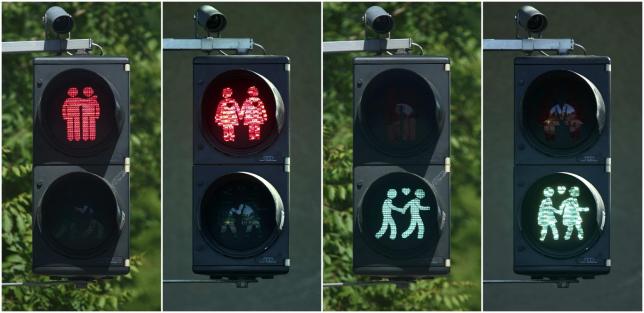In post-gender Europe, lines between men and women are being blurred

Europe is shaping up to be what advocates call a post-gender world where boundaries between sexes are blurred even more so than in America.
In this post-gender world, no room is left for women to be women and for men to be men, according to The Washington Post.
For instance in Berlin, new billboard ad policies ban the depiction of girls in pink "with dolls" or boys in blue playing "with technical toys." In ads showing both adult women and men, females cannot be depicted as "hysterical," "stupid" or "naive" in the company of men who are presented as "technically skilled," "strong" or "business savvy."
Women cannot also be shown "occupied in the household with pleasure."
"Women are always portrayed in a nice, easygoing way, and that is what we do not want," said Petra Koch-Knöbel, the chief of the committee that penned the new ad rules which took effect last April. The rules will be expanded to privately-owned websites.
Critics call it as further evidence on an attack on gender roles, especially against heterosexual men.
"We are allowed to smile where and whenever we want, even while doing the dishes," Die Zeit newspaper columnist Harald Martenstein wrote on the benefit of the new ad rules on men.
In Sweden and Denmark, the battle against sexual inequality has been going on for years, with Sweden pioneering progressive policies toward women and Denmark legally recognizing same-sex couples way back in 1989.
Germany—home of Chancellor Angela Merkel, deemed as the most powerful woman in the world—became the largest nation in Europe in March to decree that the 30 percent of seats on corporate boards must belong to women.
But now, advocates in Europe are pushing for "gender mainstreaming," or the erasing of lines between the sexes and calling for laws to make sure everything, including language, is gender-neutral. This is not only meant to promote equality for women and gender minorities but also to break the dominance of males.
Critics say they see a rise of militant feminism and gender-based political correctness that changes age-old traditions.
Niko Schilling, a sports organiser at the University of Passau in Bavaria, said he was shocked when the school's equal opportunity coordinator disallowed him to hold a series of contests, including one involving a Bavarian tradition called "fensterln," in which men in lederhosen race up ladders to be the first to kiss a woman on a balcony.
"I thought it was an April Fools' Day joke when she called me five days before the event and told me it was offending university guidelines," he said. "Gender mainstreaming is going too far in some respects."
In Sweden, the gender-neutral pronoun "hen" was added to official dictionaries after it was used by a preschool in Stockholm as an alternative for "boys" or "girls" to avoid referencing gender roles in children.
In Germany and Austria, some advocates are pushing for a change in the usage of gender-based language. For example, nouns like "police officers" or "teachers" take a masculine form even when referring to a mixed group of men and women. Professors in some universities in both countries also urge their students to use gender-neutral language in their papers.
"Language reflects power structures," said Anne Wizorek, a self-described feminist author based in Berlin. "If we want an inclusive society, we need to reflect that in our language."
Austria even officially changed the language of its national anthem to celebrating "great daughters" and "sons," from just "great sons."
The movement has spilled over to traffic lights in Germany, particularly in cities like Bremen and Cologne where many of the male figures were replaced with those of women. Meanwhile, in Vienna, figures of heterosexual and same-sex couples have replaced traffic-sign figures of lone men.
Even in toys, the 2015 catalogue of the German toy store BR-Spielwaren shows a girl playing with a toy gun and boy in an apron playing in a toy kitchen, following examples from gender-neutral Swedish retailing.
In Berlin, where it is normal to see naked men and women bathe under the summer sun in parks and public pools, at least six unisex toilets — most with multiple stalls and some fitted with urinals — have opened in Berlin city administration buildings and theatres.
"Initially we were laughed at for this, but now that people are discovering that unisex toilets are just normal bathrooms, we are experiencing rather broad acceptance," said Simon Kowalewski, a member of the Berlin state parliament whose Pirate Party proffered the idea in the first place.
But it still takes some getting used to. The unisex toilets in Studio Я theatre in Berlin have blooms decorating the urinals, along with a sign saying "Flowers for a Gender Free World."
"Should I water the flowers now?" asked Felix Witzlau, a 26-year-old student.
He shyly chose a stall instead. "It did feel a bit awkward hearing female voices outside," he said after emerging from a toilet. "But I could get used to it."











